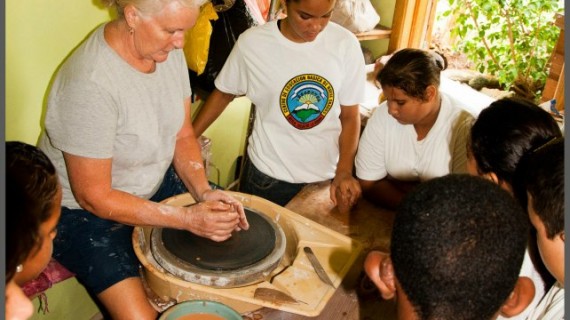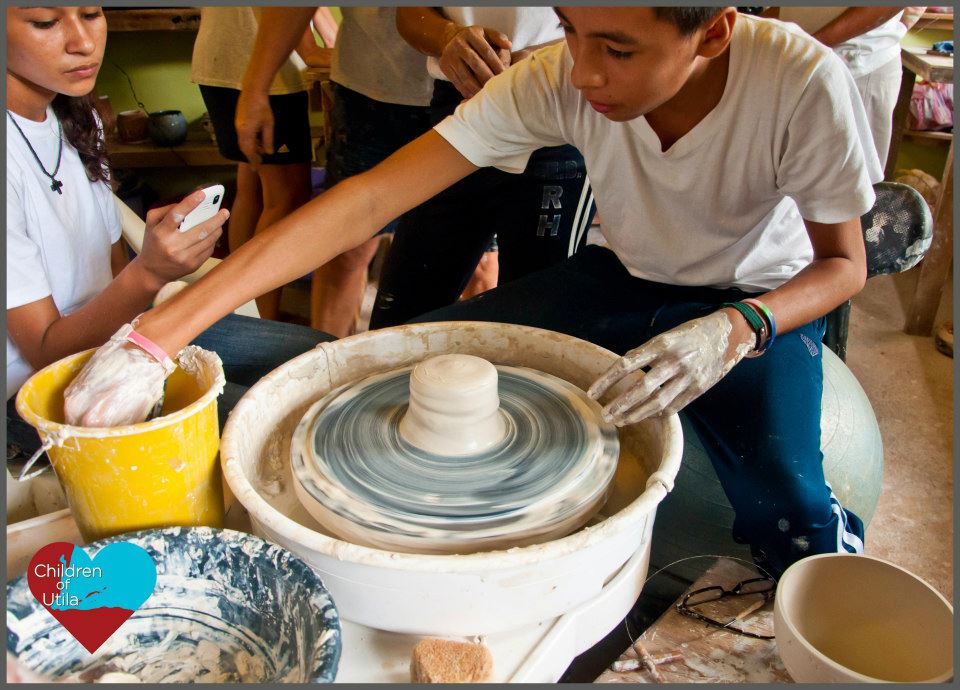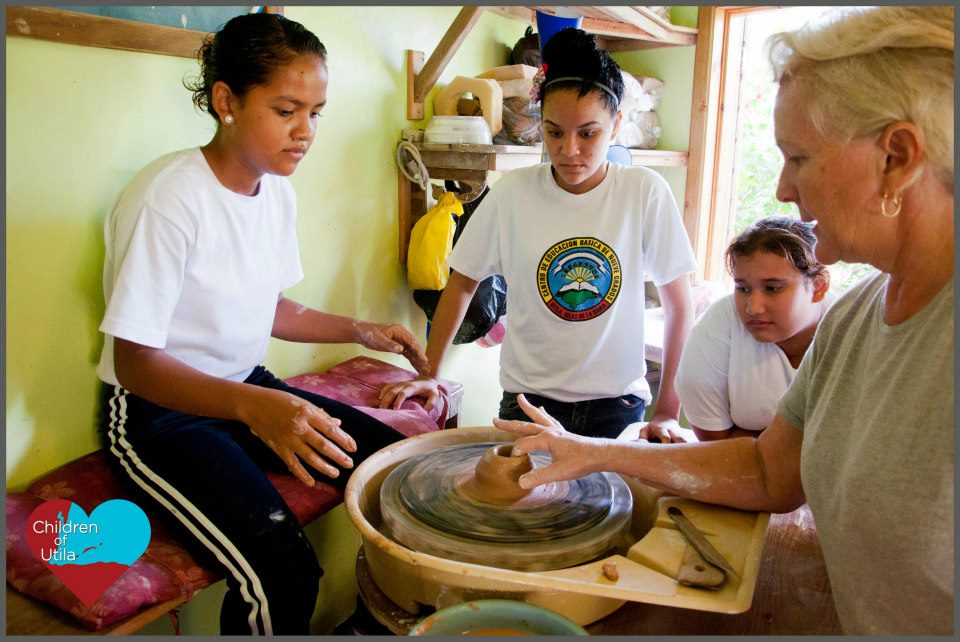By Jennifer Orrange of Utila Guide
“Give back, teach a trade! That is the motto of Utila resident Sharon Taylor who has started Utila’s First Trade School that is on track to open officially by the end of the summer.
Sharon Taylor is a transplant to Utila from New England but is not a new-comer to the island. Taylor has been visiting Utila since 2003 when she and her husband spent a vacation at Laguna Beach Resort. The couple fell hard for Utila’s uniqueness and charms and felt they would most certainly return so they purchased a piece of property on that very first visit!
Making yearly trips since then and building their home up slowly with each visit, Sharon and her Husband have finally realized their goal of retiring to their tropical home in Utila after one of the most aggressive winters up north in decades.
“This time when we landed, we knew we were finally coming home.”
A physical therapist by trade, Taylor and her husband are not strangers to living in Latin America and spent their formative years living in developing countries worldwide. Taylor provides her services as a physical therapist three times a week at the Utila Community Clinic where 90% of what she charges for her services fund the Utila Bay Islands Trade School (UBITS), the organization she has envisioned for Utila since deciding to live here full time.

Upon her initial visit to Utila, Taylor realized there was a certain void that needed to be filled concerning the many young adults that needed to have something worthwhile to put their time and energies into. She felt that young people lacked visions for the future and that they needed to be taught how take ownership of something they could create and generate an income off of.
Clay pottery has always been a hobby for Taylor and it is this particular talent that she could see putting to good use by introducing the young people of Utila to the trade of clay pottery.
Pottery making is a part of the Mayan history and culture of Honduras as evidenced at ruins in Copan. Relearning this skill gives youngsters a sense of pride in their heritage as well as teaching them a valuable skill with which to market themselves.
With the trade school on the island, young tradespeople will be able to create something to sell to tourists to take home as a souvenir or to eventually export off the island. Things that have been created and sell almost as soon as they’re cool enough to touch are clay mosquito coil burners with lids that look pretty and help decrease the burning time by about half. Wine bottle coolers and the traditional clay anafres serving dishes with the small brazier underneath and a bowl for the bean and cheese fondue type dip on the top. “We can’t make enough of them”, says Taylor, “almost as soon as I post them on Facebook we sell out!” Taylor said that they do envision having a store front in the future once they are operating at a higher capacity.
Most recently, the artists have been churning out creative garlic roasting dishes and beautiful clay bread pots which are not only pretty to look at but highly functional as a simple and time effective manner way to bake a loaf of fresh bread.
“Most young adults from a lower socio-economic standing can’t see their future and they have no sense of ownership. These people need something for which to be accountable for so at the end of the day they will be able to take what they have made, sell it and be able to feed their families and themselves”.
The head instructor Levis, who is himself the first UBITS success story, started with Taylor at the age of 16 and is now building his own home for his family. Getting young adults to realize their worth is one of the most difficult lessons to teach according to Taylor. Once the head instructor realized that he must pay himself first, he was able to move forward in his career and make building his own home a reality.

Soap making is another skill to be taught at the trade school sourced as much from available local resources as possible. These soaps sell well on this island to hotels and tourists wanting to take a piece of the island home with them and as gifts. Utila coconut oil and limes are just two of the widely available ingredients that go into the silky bars of soap. On most days soap can be purchased from a table just outside of Bush Supermarket where the soap makers set up shop with a scale and their delightful natural soaps.
UBITS holds a vision for the future in that it will be able to offer training to young adults in welding, sewing, batik production, soap making and beach furniture construction. Currently, the trade school is attempting to use all it can from the surrounding environment and hopes to continue with this fashion: “We burn wood that washes up on the beach in our kiln as well as other beach rubbish and are experimenting in the different types of glazes we use on the pottery from salt glaze from the sea water and dried up sea weed” said Taylor.
The mayor of Utila is in full support of the Trade School project. One of the local schools has a space already roughed in that had been intended for use to teach trades in but never came to fruition. That is the space where UBITS will be setting up their work shop over the next couple of months. “We were donated the bricks with which to build our own kiln from a woman in Guanaja who had attempted to start a trade school there but it never got off the ground. We have the bricks and will begin building our kiln over the next couple of months at the school site”, said Taylor. She assures that the opening of the school was not tied to the completion of the brick kiln, as there is another, smaller kiln that can be used in the meantime.
Taylor estimates that the school should open in about two months, around the middle of September. The trade school is targeting students who have completed their schooling up to the eighth grade.
A lot of children are finished their formal schooling upon completing grade eight and have very little direction after that. UBITS is providing the opportunity to continue their professional training and skill set building. They are requiring prospective students fill out an application and get a recommendation from a teacher. The Ceramics program will be one month long, three times per week, four hours per session. Students will need to be sponsored as it will cost approximately $300 per student. “Most skills take time and practice to master” said Taylor, for example it takes three years to get good at ceramics. Once a student successfully completes the program they are welcome to stay on and apprentice, the studio will be open to those who graduate but they will need to provide their own supplies.
Sources for clay are currently being researched on the island of Utila “the students are generally taken aback when their first lesson is to dig in the dirt, but it is good for them to understand where the clay comes from and all the work it involves.” Taylor explained “it is very interesting to work with clay from different areas around Honduras, as depending on where it has originated it has defining characteristics including the color.
Most recently, Sharon was called by the developers at Coral Beach Village on Utila’s south shore to go and check out some of the clay they had dug up. “We were really excited as the last batch we were called to look at elsewhere on the island just turned out to be swamp mud- but this is wonderful!! Went into kin olive green and came out deep red and very hard! I won’t have to buy clay again!”
“This is a country with a lot of clay and we know that because they Mayans had to have access to something” Laughed Taylor.
Taylor said she offers classes outside of trade school hours to locals or visitors who are looking for a creative outlet and would like to learn how to work with clay.
Sharon can be contacted through the Utila Bay Islands Trade School – Honduras, Facebook Page
Photo Credit to: Jeanne Perkins of Children of Utila

